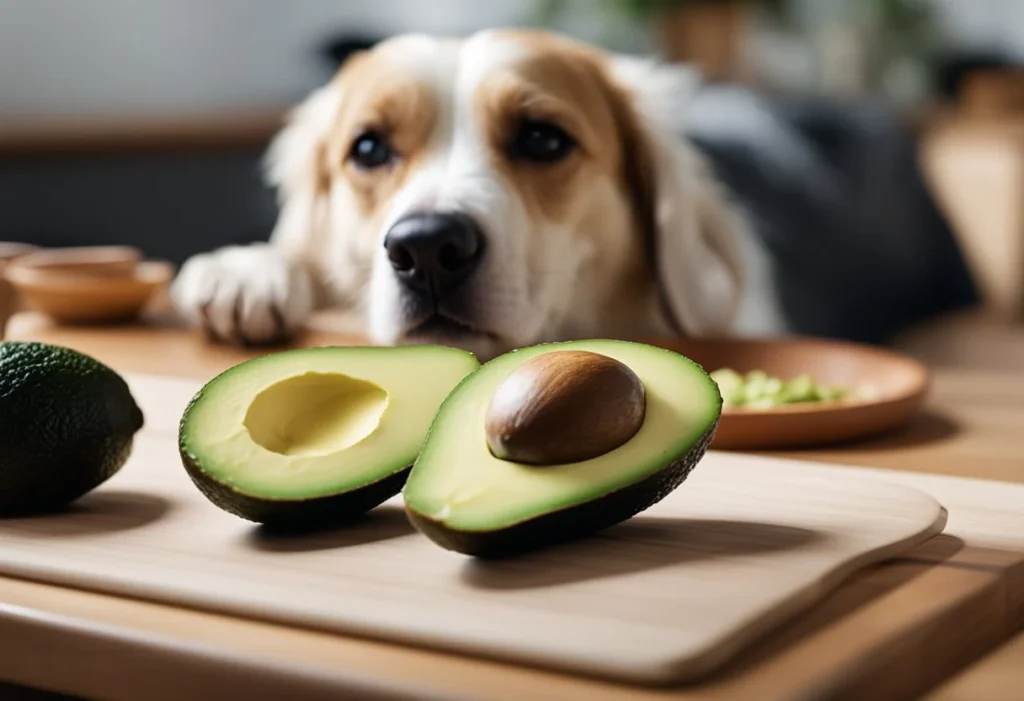Can Dogs Eat Avocado?

Can Dogs Eat Avocado?:- Avocados contain persin, a compound that can be harmful to dogs. This toxin is found in the fruit, pits, leaves, and the plant itself. While the exact amount of persin that could be lethal isn’t well-defined, high doses can lead to symptoms like vomiting, diarrhea, and even heart issues in dogs.
The high-fat content in avocado flesh can upset a dog’s stomach and potentially lead to pancreatitis. Additionally, avocados are calorie-dense, which can contribute to weight gain. Another risk is the pit in the center of the fruit, which poses a choking hazard for dogs.

Avocado pulp is not toxic to dogs and contains beneficial nutrients like vitamins, fatty acids, and antioxidants. However, avocados are high in fat, which can lead to pancreatitis—a serious inflammation of the pancreas. This condition can be dangerous and potentially fatal, even if your dog consumes only a small amount of avocado pulp.
To provide your dog with similar health benefits without the risk of pancreatitis, consider offering them alternative foods. Foods that are lower in fat and safe for their digestive system.
Avocado Pit
Dog’s digestive system can not easily digest the pit of an avocado which can lead to a blockage in the stomach or intestines.
If a dog ingests an avocado pit and their system can’t break it down, the pit may get stuck partway through their intestines. In such cases, the only solution is surgical removal, similar to treating a blockage caused by a rock or rubber ball object.
Avocado Leaves, Bark, and Skin
Avocados contain a substance called persin, a natural antifungal compound. While persin can be toxic to some animals, dogs and cats generally aren’t sensitive to it. However, other animals may be affected.
Persin levels can vary depending on the avocado type and growing conditions, and it is found in the leaves, skin, seeds, and fruit of the avocado.

Ingesting large quantities of persin might upset a dog’s stomach, but a dog would need to consume a significant amount of leaves, bark, or avocado peels to be affected. Though dogs might chew on avocado pits, it’s unlikely that they will eat large amounts of avocado leaves or peels.
What to Do If Your Dog Eats Avocado?
If your dog eats an avocado, it’s important to act quickly, especially if you’re unsure whether they ingested the skin, leaves, or pit. Contact your veterinarian immediately for advice.
Even if you’re certain your dog only ate the flesh of the avocado, monitor them closely. Avocados are high in fat, which can upset your dog’s stomach, particularly if they’re sensitive to fatty foods. It’s still a good idea to check in with your vet to ensure your pet stays healthy.
Downsides of Avocado for Dogs
Avocado trees produce a fungicidal toxin called persin, which is primarily found in the leaves, pit, and skin of the fruit, though small amounts are present in the flesh as well. Consuming avocado can lead to digestive issues like an upset stomach, vomiting, and diarrhea, and in severe cases, it may cause myocardial damage.
The flesh of avocados is calorie-dense and high in fat, which can lead to gastrointestinal upset, pancreatitis, and weight gain if consumed in large amounts. The avocado pit poses a choking hazard and can cause intestinal blockages if ingested.
While the flesh of the avocado is less harmful to dogs than other parts of the fruit, it’s important to note that avocados can be toxic to other animals. The American Society for the Prevention of Cruelty to Animals (ASPCA) reports that avocados can be harmful to horses, birds, goats, and rabbits.

What Happens if My Dog Eats Avocado?
Dogs can Eat Avocado and Small amounts of avocado flesh generally don’t pose a significant risk to dogs, as this part contains the lowest levels of Persin, a compound that can be toxic to them. However, consuming larger quantities of avocado can be more dangerous. There has been a reported case where two dogs developed heart failure after eating large amounts of avocado over an extended period.
If your dog consumes a large quantity of avocados in one go, they might experience vomiting or diarrhea since avocados are rich in fat, which can upset their stomach. Additionally, high-fat foods can trigger pancreatitis, a severe condition in dogs.
Another important consideration is that avocado pits or stones can pose a choking hazard or potentially cause an obstruction in your dog’s digestive tract. To keep your dog safe, make sure avocado pits are kept out of their reach. Some people have avocado plants at home or in your garden, make sure they are inaccessible to your pets.
If your dog has ingested avocados, monitor them closely for any unusual symptoms or changes in behavior. If you notice anything worrying, contact your vet right away.
When is avocado harmful to dogs?
While avocados offer healthy fats, which can be beneficial, too much fat can pose risks to your dog. Excessive fat intake can lead to pancreatitis, a serious condition that may require hospitalization. Additionally, dogs with certain health issues may need low-fat diets, and overconsumption of avocado can cause gastrointestinal upset, including diarrhea or vomiting.
Avocado pits, leaves, skin, and the plant itself has a toxin called person, which makes these parts potentially harmful to pets. Small amounts of persin are also present in the fruit’s flesh. And the exact lethal dose of persin is not well-established, large quantities can lead to diarrhea, vomiting, and damage to the heart muscle.
The good news is that while persin can be fatal to birds, goats, cattle, and horses, dogs are more resistant to it. Your dog would need to consume a significant amount of avocados to suffer any toxic effects. However, it’s best to be cautious and keep your dog away from avocado plants, as the toxin is more concentrated in the stem, pits, bark, and leaves.
Also Read:-




